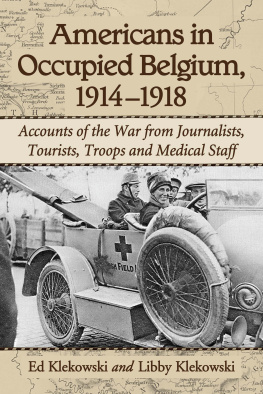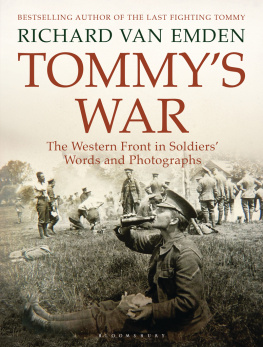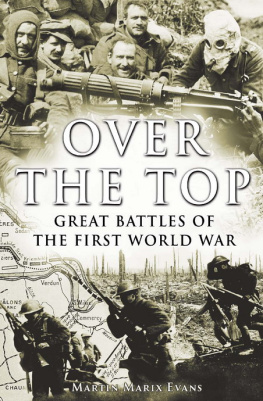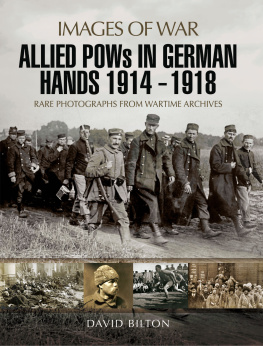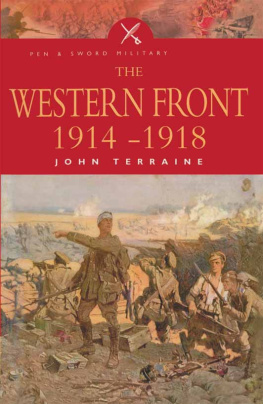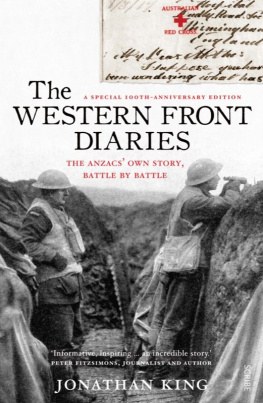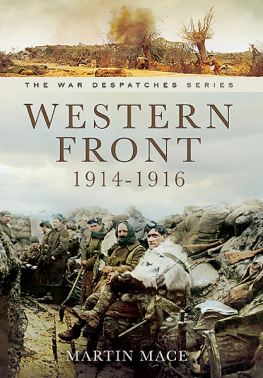By Lord Moyne
IT IS appropriate that I should express my great appreciation of the work of the two editors in selecting what is of interest from a military historians point of view from my fathers account of his experiences in the First World War, and in collating it with letters written to my mother, from which they have quoted in appropriate cases. I would also like to pay tribute to Brian Bond for his introduction which puts so well into perspective the interest of these day-to-day records.
As the same person as the small boy who watched my father ride by on his mare Butterfly in 1914 on his way to parade with the Yeomanry on a sunlit morning in Suffolk, it fills me with sadness to think of the horrors of trench warfare he was so courageously to face, in spite of my pride in his two DSOs. If I was at home from my prep school he never failed in his kindness to me during his brief spells of leave. But, though he never speaks of his feelings in the Diaries, it was not for years after the war that I felt him to be free from the strain of what he and so many others had undergone.
Some words of explanation and justification are perhaps required for the decision to publish yet another British army officers contemporary account of the First World War after the passage of so many years. The importance of these memoirs lies partly in the personality and distinguished public career of their author, Walter Guinness, Conservative Member of Parliament for Bury St Edmunds from 1907 to 1931 and later to hold high political office and be created first Baron Moyne.
Even more significant, however, is the comparatively rare standpoint in the military hierarchy from which Guinness recorded his personal impressions of the war. Many generals published war memoirs in the inter-war period, and more recently the diaries, letters and recollections of numerous subalterns have appeared. We are thus well-provided both with strategic and political interpretations of the war at Army and Corps levels and with the combat experiences of company and platoon commanders. However, the practical day-by-day running of the great war machine by battalion, brigade and divisional staff officers has seldom been so graphically and interestingly described as in Walter Guinnesss diary and letters. Although Guinness personally experienced and described a great deal of frontline fighting in Gallipoli and, later, on the Western Front between mid-1916 and the end of the war, his recollections are probably more valuable to historians for the light they throw on the articulation of the fighting units through training, supply arrangements, the demarcation, repair and maintenance of the trench system, signal communications and liaison with flank units and with the supporting artillery. These aspects may be less dramatic than the great battles from Neuve Chapelle to Passchendaele, but they are essential to an understanding of how the war was actually conducted. Serious students of the war, as distinct from readers who merely wish to reinforce preconceptions of its frightfulness and futility, will profit from Guinnesss informative but largely unemotional account. As a family man, politician and amateur soldier the diarist was eager to see an end to the war, but he never doubted that Germany had to be defeated.
Before providing a brief introduction to some of this volumes interesting aspects, a few words must be written about the nature of the documents and how they have been edited for publication. As the introductory note makes clear, these are not, in the strictest sense, diaries. Guinness records in 1919 that he had not had time to keep a diary and that his recollections were already becoming blurred. Unfortunately the top copy of his original memoir of 1919 has disappeared and with it the maps and appendices to which he occasionally refers. Fortunately, however, large batches of his daily letters to his wife and pencilled notes which he enclosed in them have recently come to light, and from these it is clear that Guinness wrote up his diaries from the letters and notes. In some entries the diaries exactly reproduce the letters, while in many others there are only minor variations. Obviously in writing up the diaries (possibly for later publication), Guinness was inclined to omit purely personal matters, such as enquiries about his familys health and the career prospects of relatives and friends; he also omitted, toned down or summarized some bitter outbursts about the incompetence or unpleasantness of individuals. But after a careful comparison between the typed copy of the diaries and the surviving letters and notes the editors felt that the latter added significantly to the diaries at only a few points. Extracts from letters or notes have therefore been inserted in the appropriate places. The editors have also made minor amendments to the text in the way of spelling out abbreviations, clarifying ambiguous sentences, deleting repetitions and correcting obvious typing errors. We have kept explanatory notes to a minimum on the assumption that most readers will have a sound general knowledge of the First World War and access to the standard works of reference. Unfamiliar names are another matter, however, and we have included an appendix of biographical notes for virtually all identifiable individuals mentioned in the text, marking their inclusion by an asterisk at the first mention of their names. Sketch maps have been provided to enable the reader to follow the diarists movements, particularly in the battles in which his unit was engaged.
Walter Edward Guinness was born in Dublin in 1880, the third son of Edward Cecil Guinness, later the first Earl of Iveagh. He was educated at Eton where, in addition to athletic prowess, he developed a deep and enduring interest in biology. He thought of pursuing this subject at Oxford, but instead in 1899 he volunteered for service in South Africa with the Suffolk Yeomanry. He was wounded, mentioned in dispatches and ended the war with the rank of captain in the Yeomanry and honorary captain in the Regular Army. He first stood for Parliament in the general election of 1906 but was defeated in the Stowmarket division of Suffolk where his father had purchased Elveden, the famous sporting estate. In 1907, however, he was returned at a by-election for Bury St Edmunds and continued to represent that division until 1931. He was also a member of the London County Council from 1907 to 1910. He remained in the Suffolk Yeomanry and on the outbreak of war in 1914 was second-in-command of a regiment with the rank of major.
Readers will probably conclude that Guinness did not attain rank or exercise responsibilities commensurate with his abilities, dedication to duty and experience. He was unlucky in that his Yeomanry regiment was not sent overseas until the autumn of 1915 and then, after the harsh experience of the final phase at Gallipoli, was left for several months in idleness in Egypt. At the Anzac bridgehead Guinness had taken command of a battalion (1/10th London) and was briefly in charge of another (1/5th Norfolk) at the same time, owing to the acute shortage of officers; but when he at last arrived in France in August, 1916, he again found himself in the rather humdrum appointment of second-in-command of a battalion and a poor one at that (11th Cheshire). Guinness craved a front-line command or, failing that, an active staff appointment with troops, as distinct from a comfortable headquarters assignment in the rear. But he was in competition with ambitious regular officers and, rather modestly in view of his sharp criticism of several individual regulars, felt that they deserved priority. Critics like Sir Philip Gibbs have indicted the High Command for its trade union mentality in blocking the promotion of able young amateur officers, and indeed of regular officers without the Staff College qualification (p.s.c.) to staff appointments. But by 1916 there was such an acute shortage of competent officers that staff positions, especially at brigade and divisional level, were given to talented amateurs. In addition to Walter Guinness, these included E. M. W. Grigg (later 1st Baron Altrincham), W. A. Greene (later Baron Greene), Oliver Lyttelton (later Lord Chandos), J. H. Boraston (the lawyer who edited Haigs despatches) and Anthony Eden (later Earl of Avon).



